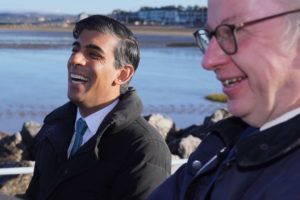Driving through an affluent suburb of Düsseldorf in the Seventies, J.G. Ballard had a vision. Like Shepperton, Ballard’s hometown in Surrey, this 20th-century arrangement of wealth, leisure and family located on the fringes of a great city seemed eternal. A semi-detached house 30 minutes from the urban centre. A car, a garage, the family holiday to Portugal. From Tokyo to London, this was the future. What could possibly go wrong?
Today, England’s rendering of this fantasy, otherwise known as the Home Counties, seems warped and unstable. Travelling through Surrey, from the quiet villages nestled in the North Downs to its London border in the north, it resembles not a cliché of suburban aspiration, but a capsule of all England’s problems: the demise of its ruling party, a lost generation of millennials, polluted waterways and a cost-of-living crisis. In these leafy streets, decline and affluence have become entwined.
The Conservative Party has always relied on the Home Counties — both to symbolise its vision for England and for its dependable voters. Now, as even this region is threatened, other parties are sweeping in and vying for a new future coalition of voters. “The Tory party needs to die,” says Westminster’s new Liberal Democrat candidate in Mole Valley, Chris Coughlan. He is the product of the Surrey incarnation of the suburban dream; the son of a stockbroker, he grew up in the village of Peaslake, joined the army and then the Conservative Party, and had a stint in the City. He is now one of the many Lib Dems trying to do the unthinkable: turf the Tory party out of its spiritual home.
With the local elections less than two weeks’ away, the Battle for the Blue Wall, the affluent suburbs that cling onto London, is now very much on. The first skirmish came in 2019, when Dominic Raab nearly lost his seat to an unprecedented Lib Dem surge around the Surrey town of Esher. But the past three years appear to have set up a far bigger fight that goes well beyond the revenge of the Remainers. Alongside the material decline of the Home Counties, a further dimension to the campaign has opened up. As London ages and gentrifies, and a “parasitical housing market” bites, an exodus of young families, millennials and renters unable to afford life in the capital have found themselves pushed beyond the sprawl of London and out into the Tory shires.
This is not the ordinary flight to the suburbs that comes with each generation’s economic maturity. Not all of these newcomers are young families seeking homes. Professional-millennial émigrés have made areas of Surrey such as Guildford and Tandridge some of the fastest-rising areas for youth voters in the country. And they have found themselves in a very different home county from the stereotype of Surrey comfort. The south-east has seen the biggest fall across the country in disposable income since 2019, with a gap opening up between median income and house prices that far outpaces the rest of England. More recently, some of the country’s most expensive mortgages were among those hit hardest after the Truss Budget. Nor is the county immune from the cost-of-living crisis. Throw in rising unsolved crime levels and a cripplingly expensive commute into the capital, and it’s not unreasonable to talk about a wave of de-gentrification taking place not just in Surrey, but across the Home Counties.
The material circumstances that once made these places Conservative are starting to crumble. But the battle for the Blue Wall will not just be fought along a straightforward economic realignment. Surrey still has some of the country’s wealthiest postcodes and an established Tory party machine. And for their most proximate challengers, the Liberal Democrats, a vision for Surrey that somehow ties together Tory defectors with younger economic exiles isn’t clear.
Their targets fall into two categories: the “Surrey Shifter”, (young, newly-arrived from London) and “Waitrose woman” (middle-to-late aged and socially conservative). But while both are some of the most “Bregretful” in Britain, beyond that they have little in common. And nothing divides them more than the issue of housing. Millennials are the Yimby generation, overwhelmingly in favour of increased house-building. But here the greenbelt is sacred, and though judicial review has been forced to intervene, Surrey Nimbyism is a well-funded and experienced political force, courted by both parties on the council. Down the road in Wisley, plans to build a new town of 2,000 houses have triggered outright rebellion among disgruntled locals. As ever in this part of England, the home-owning dreams of the new generation is becoming the older generation’s nightmare.
One way to cut through the schism is to talk about other things, mobilising instead the apathy and disaffection that is more or less universal. Knocking on the door in Surrey, “the worst it’s ever been in our lifetime” will do well as a campaign slogan. Coghlan certainly says it a lot and so do other Tory defectors. Young families are using food banks in Dorking; the River Mole that runs through the Surrey Hills is one of the most polluted in the country. When Ed Davey came to visit Mole Valley, he was taken to a swimming pond in Fetcham, which is now, as one local told me, “full of shit”. The arrival of England’s decline in these once-protected suburban idylls is now as visible as it is pungent.
For Geoff Eaton, a 64-year-old businessman and lifelong Tory voter, a reckoning is coming for his old party, which has “lost its moral compass”. He complains about lies, Brexit and even the lost legacy of the London Olympics. “The Conservative Party has moved away from me,” he says, “I haven’t moved away from the Conservative Party.” When I bring news of this reckoning on the Surrey doorstep to Sir Paul Beresford, the Mole Valley MP, he seems unfazed. Along with 27 colleagues, the Tory grandee has announced he is standing down at the next general election — a decision that possibly reflects the fact that his seat, which saw a record Lib Dem swing in 2019, is no longer the quiet Tory shire it once was. But when I ask if the character of Surrey has changed under him, he seems oblivious to the tensions. “In the past”, he says, “when I get talking to Surrey people, they usually come round to my way of thinking.”
But who is a “Surrey person” now? Electoral regions cannot be so easily presumed anymore. It’s much like asking who a Red Wall voter is. But while other realignments in the North and Scotland have been driven by a sense of political betrayal, in Surrey, the failure to reward conservative aspirations has elicited a different response. In the high streets of Dorking and Guildford, the Lib Dems can look for Waitrose Mum and Surrey Shifter, but their sense of decline translates not into political activism but terminal apathy. “I have absolutely no interest anymore in this country,” says Kieran, who moved to Surrey just before the pandemic with his girlfriend, and now does an evening Uber stint so he can save enough to escape to Canada. “Everything went wrong after Brexit,” says his opposite number, Jayne Bleby outside an artisan butchers. “But I can’t vote for the Lib Dems. There’s just something about them that’s not quite right.” Another gentleman in Bookham is blunter when I try to tease out his views on the county’s future: “Surrey is like the rest of England; it’s becoming a shithole.”
“If the Conservative Party can’t win here, where can they win?” one Tory strategist said to me despairingly. Next week, his disbelief will be put to the first of many tests, not just in Surrey, but across the Home Counties, the towns and villages that once offered a tangible encapsulation of English conservatism’s ambitions. With the structural and generational changes of the last few years, it’s unclear whether the Tories’ vision for England still commands any loyalty here. Of the sleeping 20th-century suburbs, Ballard also said they “dreamt of violence”, to escape the stifling boredom of their eternality. The search for a new suburbia forebodes a different disquiet that will last well beyond the May elections.
Disclaimer
Some of the posts we share are controversial and we do not necessarily agree with them in the whole extend. Sometimes we agree with the content or part of it but we do not agree with the narration or language. Nevertheless we find them somehow interesting, valuable and/or informative or we share them, because we strongly believe in freedom of speech, free press and journalism. We strongly encourage you to have a critical approach to all the content, do your own research and analysis to build your own opinion.
We would be glad to have your feedback.
Source: UnHerd Read the original article here: https://unherd.com/




